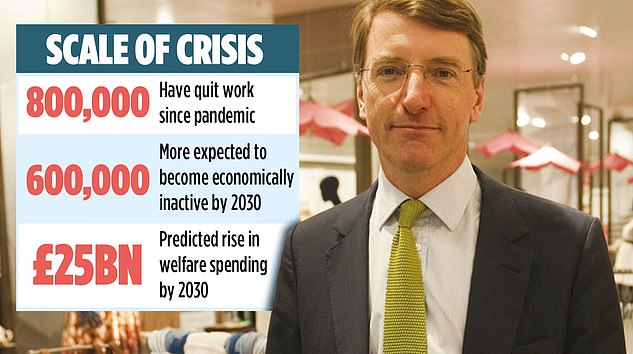Sir Charlie Mayfield, the former boss of John Lewis, will this week call for urgent action to tackle the surge in the number of people who are not working due to sickness or disability.
His report, Keep Britain Working, is due to be published this week.
It is expected to draw attention to the worrying rise in young people who have dropped out of the labour market, many of them citing mental health problems.
Leading employers including accountancy giant PwC, Tesco and Mayfield’s former employer the John Lewis Partnership are expected to back his report.
The dramatic rise in the number of people being signed off work due to ill-health has fuelled fears of a sick note culture that risks jeopardising growth, which is already sluggish.
The combination of lost productivity and higher benefit costs is a problem for the Chancellor in the run-up to the Budget, as she faces a multi-billion-pound black hole in her coffers.

Get well soon: Charlie Mayfield will highlight the damaging effect on individuals, as well as the economy
Mayfield is likely to say that fulfilling work can be beneficial for health and well-being, as it guards against isolation and can boost self-esteem.
He is expected to highlight the pernicious effects of inactivity on the economy and on individuals, who often suffer financially and psychologically.
The report, which is backed by the Government, is likely to find that economic inactivity due to sickness has worsened in the UK compared with similar countries.
If recent trends continue, another 600,000 people will become economically inactive over the next four years, on top of the nine million who have already left the labour market.
Growth in working-age health and disability benefits could add £25 billion to welfare spending between now and 2029-30.
Since the pandemic, the number of people who have quit the workplace entirely because of sickness and disability is up by 800,000.
Over the same period, two million more people say they have health conditions that limit their ability to work, an increase of more than 30 per cent, according to evidence compiled for Mayfield. The biggest rise is among young people aged 16 to 34, where the numbers are up by 1.2 million or 77 per cent. Of those, 530,000 young people said their main condition was mental health-related.
It is not clear why mental health among young people has deteriorated so dramatically, though possible causes include social media and the pandemic. The report is likely to highlight long delays for people seeking help from the NHS with mental health.
There are also long delays for those with musculoskeletal problems, which are a big cause of absence in older people.
Mayfield’s recommendations will draw on existing best practices among employers. Measures are expected to include protocols for staying in touch with employees who are off sick so there is less chance of them becoming disconnected from the workplace.
DIY INVESTING PLATFORMS

AJ Bell

AJ Bell
Easy investing and ready-made portfolios

Hargreaves Lansdown

Hargreaves Lansdown
Free fund dealing and investment ideas

interactive investor

interactive investor
Flat-fee investing from £4.99 per month

InvestEngine

InvestEngine
Account and trading fee-free ETF investing

Trading 212

Trading 212
Free share dealing and no account fee
Affiliate links: If you take out a product This is Money may earn a commission. These deals are chosen by our editorial team, as we think they are worth highlighting. This does not affect our editorial independence.
